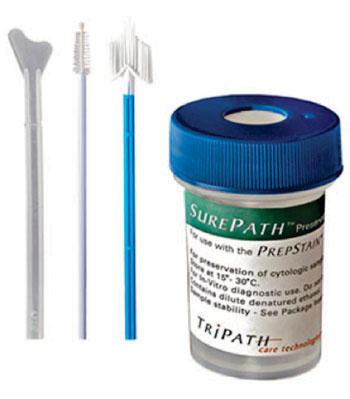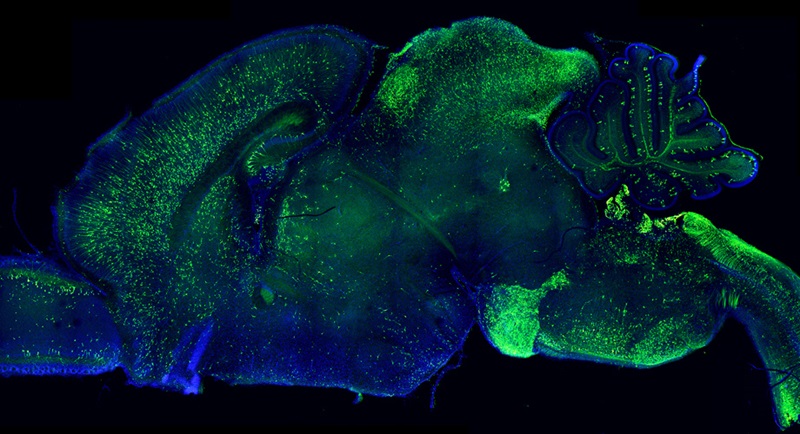HPV Test Approved for Use with SurePath Preservative Fluid
|
By LabMedica International staff writers Posted on 03 Aug 2016 |

Image: The SurePath preservative fluid kit (Photo courtesy of Becton Dickinson and Company).
Human papilloma virus (HPV) infections are the most common sexually transmitted infections in the USA, and HPV genotypes 16 and 18 cause approximately 70 % of cervical cancers worldwide. According to the National Cancer Institute, there will be an estimated 12,990 new cases and 4,120 deaths from cervical cancer in the USA during 2016.
Prior to the approval, some laboratories used cervical cell samples collected in SurePath Preservative Fluid to run HPV tests, in lieu of collecting an additional sample in a separate collection fluid that had been approved for use with those tests. Patients who receive false negative HPV test results may not receive appropriate follow-up care, which could lead to cervical cancer progression.
The US Food and Drug Administration (FDA, Silver Springs, MD, USA) approve HPV tests to be used with specific collection fluid, which store and preserve cervical cell samples for testing in the laboratory. The FDA based its approval of the Roche cobas HPV Test (Roche Molecular Systems, Basel, Switzerland) with SurePath Preservative Fluid (Becton Dickinson and Company, Franklin Lakes, NJ, USA) on a clinical study of 952 eligible women 21 years and older with abnormal Papanicolaou (Pap)test results.
The Roche cobas HPV Test with SurePath Preservative Fluid demonstrated similar clinical performance when compared to a previously approved cervical sample type. Of the samples that tested positive for HPV using the Roche cobas HPV Test with SurePath, 95.4% obtained the same result as the reference sample. Of the samples that tested negative for HPV using the Roche cobas HPV Test with SurePath, 93.2% obtained the same result as the reference sample.
The Roche cobas HPV Test with SurePath Preservative Fluid is approved for use with cervical cell samples obtained for a Pap test to screen women age 30 and older for HPV in order to determine whether additional follow-up and diagnostic procedures are needed. The FDA also approved the Roche cobas HPV Test with SurePath in women age 21 and older who have already had an abnormal Pap test result (borderline cellular cytology) in order to determine whether additional follow-up and diagnostic procedures are needed.
The test with SurePath is also able to detect high-risk HPV genotypes 16 and 18 in the same populations of women. The Roche cobas HPV Test with SurePath is not approved as a first-line primary HPV screening test. In addition, health care professionals should use the cobas HPV Test results together with other information, such as the patient screening history and risk factors.
Related Links:
US Food and Drug Administration
Roche Molecular Systems
Becton Dickinson and Company
Prior to the approval, some laboratories used cervical cell samples collected in SurePath Preservative Fluid to run HPV tests, in lieu of collecting an additional sample in a separate collection fluid that had been approved for use with those tests. Patients who receive false negative HPV test results may not receive appropriate follow-up care, which could lead to cervical cancer progression.
The US Food and Drug Administration (FDA, Silver Springs, MD, USA) approve HPV tests to be used with specific collection fluid, which store and preserve cervical cell samples for testing in the laboratory. The FDA based its approval of the Roche cobas HPV Test (Roche Molecular Systems, Basel, Switzerland) with SurePath Preservative Fluid (Becton Dickinson and Company, Franklin Lakes, NJ, USA) on a clinical study of 952 eligible women 21 years and older with abnormal Papanicolaou (Pap)test results.
The Roche cobas HPV Test with SurePath Preservative Fluid demonstrated similar clinical performance when compared to a previously approved cervical sample type. Of the samples that tested positive for HPV using the Roche cobas HPV Test with SurePath, 95.4% obtained the same result as the reference sample. Of the samples that tested negative for HPV using the Roche cobas HPV Test with SurePath, 93.2% obtained the same result as the reference sample.
The Roche cobas HPV Test with SurePath Preservative Fluid is approved for use with cervical cell samples obtained for a Pap test to screen women age 30 and older for HPV in order to determine whether additional follow-up and diagnostic procedures are needed. The FDA also approved the Roche cobas HPV Test with SurePath in women age 21 and older who have already had an abnormal Pap test result (borderline cellular cytology) in order to determine whether additional follow-up and diagnostic procedures are needed.
The test with SurePath is also able to detect high-risk HPV genotypes 16 and 18 in the same populations of women. The Roche cobas HPV Test with SurePath is not approved as a first-line primary HPV screening test. In addition, health care professionals should use the cobas HPV Test results together with other information, such as the patient screening history and risk factors.
Related Links:
US Food and Drug Administration
Roche Molecular Systems
Becton Dickinson and Company
Latest Technology News
- New Diagnostic System Achieves PCR Testing Accuracy
- DNA Biosensor Enables Early Diagnosis of Cervical Cancer
- Self-Heating Microfluidic Devices Can Detect Diseases in Tiny Blood or Fluid Samples
- Breakthrough in Diagnostic Technology Could Make On-The-Spot Testing Widely Accessible
- First of Its Kind Technology Detects Glucose in Human Saliva
- Electrochemical Device Identifies People at Higher Risk for Osteoporosis Using Single Blood Drop
- Novel Noninvasive Test Detects Malaria Infection without Blood Sample
- Portable Optofluidic Sensing Devices Could Simultaneously Perform Variety of Medical Tests
- Point-of-Care Software Solution Helps Manage Disparate POCT Scenarios across Patient Testing Locations
- Electronic Biosensor Detects Biomarkers in Whole Blood Samples without Addition of Reagents
- Breakthrough Test Detects Biological Markers Related to Wider Variety of Cancers
- Rapid POC Sensing Kit to Determine Gut Health from Blood Serum and Stool Samples
- Device Converts Smartphone into Fluorescence Microscope for Just USD 50
- Wi-Fi Enabled Handheld Tube Reader Designed for Easy Portability
Channels
Clinical Chemistry
view channel
3D Printed Point-Of-Care Mass Spectrometer Outperforms State-Of-The-Art Models
Mass spectrometry is a precise technique for identifying the chemical components of a sample and has significant potential for monitoring chronic illness health states, such as measuring hormone levels... Read more.jpg)
POC Biomedical Test Spins Water Droplet Using Sound Waves for Cancer Detection
Exosomes, tiny cellular bioparticles carrying a specific set of proteins, lipids, and genetic materials, play a crucial role in cell communication and hold promise for non-invasive diagnostics.... Read more
Highly Reliable Cell-Based Assay Enables Accurate Diagnosis of Endocrine Diseases
The conventional methods for measuring free cortisol, the body's stress hormone, from blood or saliva are quite demanding and require sample processing. The most common method, therefore, involves collecting... Read moreMolecular Diagnostics
view channel
World’s First One-Minute Hepatitis C Antibody Test Facilitates Quick Triage
Rapid and accurate testing is crucial in the fight against Hepatitis C. Hepatitis C blood testing determines whether someone has been infected with the Hepatitis C virus. Having regular access to testing... Read more
Game-Changing Blood Test for Stroke Detection Could Bring Life-Saving Care to Patients
Stroke is the primary cause of disability globally and ranks as the second leading cause of death. However, timely early intervention can prevent severe outcomes. Most strokes are ischemic, resulting from... Read moreHematology
view channel
Next Generation Instrument Screens for Hemoglobin Disorders in Newborns
Hemoglobinopathies, the most widespread inherited conditions globally, affect about 7% of the population as carriers, with 2.7% of newborns being born with these conditions. The spectrum of clinical manifestations... Read more
First 4-in-1 Nucleic Acid Test for Arbovirus Screening to Reduce Risk of Transfusion-Transmitted Infections
Arboviruses represent an emerging global health threat, exacerbated by climate change and increased international travel that is facilitating their spread across new regions. Chikungunya, dengue, West... Read more
POC Finger-Prick Blood Test Determines Risk of Neutropenic Sepsis in Patients Undergoing Chemotherapy
Neutropenia, a decrease in neutrophils (a type of white blood cell crucial for fighting infections), is a frequent side effect of certain cancer treatments. This condition elevates the risk of infections,... Read more
First Affordable and Rapid Test for Beta Thalassemia Demonstrates 99% Diagnostic Accuracy
Hemoglobin disorders rank as some of the most prevalent monogenic diseases globally. Among various hemoglobin disorders, beta thalassemia, a hereditary blood disorder, affects about 1.5% of the world's... Read moreImmunology
view channel.jpg)
AI Predicts Tumor-Killing Cells with High Accuracy
Cellular immunotherapy involves extracting immune cells from a patient's tumor, potentially enhancing their cancer-fighting capabilities through engineering, and then expanding and reintroducing them into the body.... Read more
Diagnostic Blood Test for Cellular Rejection after Organ Transplant Could Replace Surgical Biopsies
Transplanted organs constantly face the risk of being rejected by the recipient's immune system which differentiates self from non-self using T cells and B cells. T cells are commonly associated with acute... Read more
AI Tool Precisely Matches Cancer Drugs to Patients Using Information from Each Tumor Cell
Current strategies for matching cancer patients with specific treatments often depend on bulk sequencing of tumor DNA and RNA, which provides an average profile from all cells within a tumor sample.... Read more
Genetic Testing Combined With Personalized Drug Screening On Tumor Samples to Revolutionize Cancer Treatment
Cancer treatment typically adheres to a standard of care—established, statistically validated regimens that are effective for the majority of patients. However, the disease’s inherent variability means... Read morePathology
view channel
Groundbreaking CRISPR Screen Technology Rapidly Determines Disease Mechanism from Tissues
Thanks to over a decade of advancements in human genetics, scientists have compiled extensive lists of genetic variations linked to a wide array of human diseases. However, understanding how a gene contributes... Read more
New AI Tool Classifies Brain Tumors More Quickly and Accurately
Precision in diagnosing and categorizing tumors is essential for delivering effective treatment to patients. Currently, the gold standard for identifying various types of brain tumors involves DNA methylation-based... Read moreTechnology
view channel
New Diagnostic System Achieves PCR Testing Accuracy
While PCR tests are the gold standard of accuracy for virology testing, they come with limitations such as complexity, the need for skilled lab operators, and longer result times. They also require complex... Read more
DNA Biosensor Enables Early Diagnosis of Cervical Cancer
Molybdenum disulfide (MoS2), recognized for its potential to form two-dimensional nanosheets like graphene, is a material that's increasingly catching the eye of the scientific community.... Read more
Self-Heating Microfluidic Devices Can Detect Diseases in Tiny Blood or Fluid Samples
Microfluidics, which are miniature devices that control the flow of liquids and facilitate chemical reactions, play a key role in disease detection from small samples of blood or other fluids.... Read more
Breakthrough in Diagnostic Technology Could Make On-The-Spot Testing Widely Accessible
Home testing gained significant importance during the COVID-19 pandemic, yet the availability of rapid tests is limited, and most of them can only drive one liquid across the strip, leading to continued... Read moreIndustry
view channel
Danaher and Johns Hopkins University Collaborate to Improve Neurological Diagnosis
Unlike severe traumatic brain injury (TBI), mild TBI often does not show clear correlations with abnormalities detected through head computed tomography (CT) scans. Consequently, there is a pressing need... Read more
Beckman Coulter and MeMed Expand Host Immune Response Diagnostics Partnership
Beckman Coulter Diagnostics (Brea, CA, USA) and MeMed BV (Haifa, Israel) have expanded their host immune response diagnostics partnership. Beckman Coulter is now an authorized distributor of the MeMed... Read more_1.jpg)














